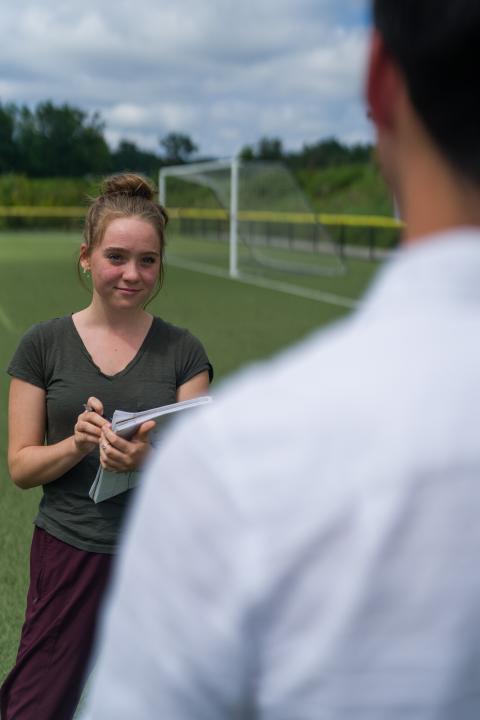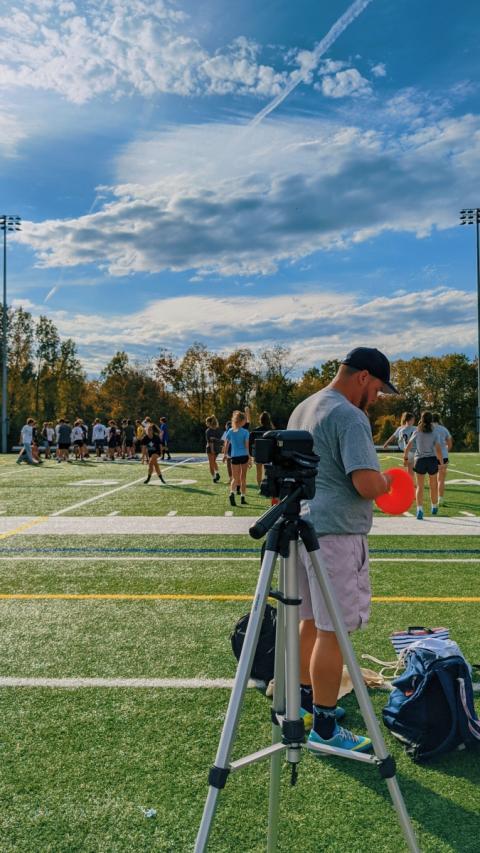Promoting the Healthy Development of Youth through Sports
Due to its diverse nature, sport has incredible potential to change lives by raising awareness for community issues and well-being. Through sport, people of all ages connect and learn from each other. A wonderful opportunity rests here for professionals to positively influence upcoming generations through the modality of sport. Many social workers are doing this by pursuing a career in youth sport coaching, where they apply theories and clinical skills to that context. Through the Research Experience and Apprenticeship Program (REAP), I joined Dr. Tarkington Newman on two research teams consisting of undergraduate and graduate students, as well as researchers from other universities.

For the first study, we researched the dual role of social workers who also serve as youth sport coaches. Through conducting interviews, we explored how their education as social workers impacts their practice when coaching youth. The second study was part of a larger America East Academic Consortium Mental Health Initiative research project. In this study, I co-facilitated a series of focus groups comprised of student-athletes, coaches, athletic trainers, and administrators.
Project One
For the first project, our question was: How has being a social worker influenced your understanding of and practices related to being a competitive youth sport coach? Our study consisted of semistructured interview questions and related probing questions. I also constructed an online survey to collect demographic data and information about relevant experience from participants who were recruited through the Alliance of Social Workers in Sports (ASWIS). During the summer, participants engaged in two, one-hour Zoom interviews. In total, we completed nineteen interviews with ten different participants.
Throughout the course of the fall semester, Cecelia Tarr (a second year Master of Social Work student) and I completed the data analysis process in NVIVO, a qualitative data software program. I constructed several main themes from the data. For example, participants described their desired to share their training and education with other coaches, specifically related to mental health, youth development, and leadership. Additionally, participants expressed that, at times, they provide support and resources to youth because some sport programs and schools lacked trained mental and behavioral health specialists. These professionals care so very much for their student athletes. Their contagious passion is why they excel in their field.
Project Two
For the second project, twenty student-athletes, coaches, athletic trainers, and administrators from the ten universities of the America East Conference were recruited to explore student-athlete mental health. Along with Dr. Newman, I helped co-facilitate a series of forty-five-minute focus groups. Currently, along with Danielle Renner, a third-year undergraduate social work student, we are analyzing the focus group data. The information gained from this study will be used to assess how student-athletes and other stakeholders understand mental health, as well as identify the mental health needs of student-athletes. Further, findings from this research will inform a larger study amongst all student-athletes throughout the America East Conference, which then will inform the development of evidence-based mental health resources.

Data collection for the project at Saint Thomas Aquinas in Dover, NH.
Significance of Results
These findings are precious, as mental health, youth development, community service, and justice studies are intrinsically linked to sport. Student-athletes interact with their coach every day. From that coach, they learn how to interact socially, how to express emotion, and how to practice self-care. When a coach doesn’t realize the extent of their impact on an athlete’s development, the coach may become sloppy in the example they set. Coaches who are not trained as social workers should be educated to recognize that stigma toward mental health remains unbridled in our society so that they can make a positive impact on their athletes with their own behavior.
In my interviews with social workers, they each expressed gratitude towards this research; moreover, they felt heard and valued. With this research, we will demonstrate the significant influence that sport has in youth development. Ultimately we can use these findings to educate other social workers and sport coaches so they can better their practices. For both studies, this research will fuel educational surveys and training for social workers, sport coaches, athletic administration, and student-athletes alike.
Reflection
I am the cofounder of the nonprofit Down the Line Ministries, which seeks to bring community into skateboarding, surfing, and snowboarding (action sports). These communities have significant mental health crises and a lot of substance misuse. The social workers I interviewed shared much wisdom and insight that I use in my role at Down the Line, such as the importance of having a growth mindset over self-determination; teaching the love of the game; educating leaders on appropriate disclosure so they can model vulnerability; and valuing the cerebral quality of prioritizing process over performance.
For the rest of my life, I’ll be involved in sports. The board sports I do are fun but unimportant—they are just a modality that makes possible the building of meaningful relationships with the people around me. A valuable piece of my research experience was the interview training I received from Dr. Newman, including coaching on small talk and pleasantries with professionals, becoming familiar with data collection and analysis software programs, and learning how to burrow into follow-up questions to reveal important thoughts. This fall I continued this research through INCO 590, and I plan to pursue additional research opportunities during my time at UNH. In my professional future, I look forward to pioneering international action sports research in mental health, community issues, and development. I am grateful for the supportive network made of researchers and athletes who are also passionate about these issues.
Now a question for you, dear reader: What “modality” do you have available to build long-lasting relationships with those around you? Perhaps you also love sports, or maybe you are an artist, entrepreneur, or craftsman. Regardless, there is always a way for you to impact those around you if you are willing to look for it.
Thank you, Tark, for infecting me with the contagious passion for social work, sport, and mental health research. To the Hamel Center for Undergraduate Research, thank you for pushing me toward this opportunity—I will only sing the praises of REAP. Thank you, Mr. Dana Hamel, for nurturing this program, and in so doing, my education. Thank you to Mrs. Elizabeth Lunt Knowles and Mr. Brett Branscombe for helping to fund my research. Thank you to all of those who have helped me along the way.
Copyright 2021, Paige O'Neil